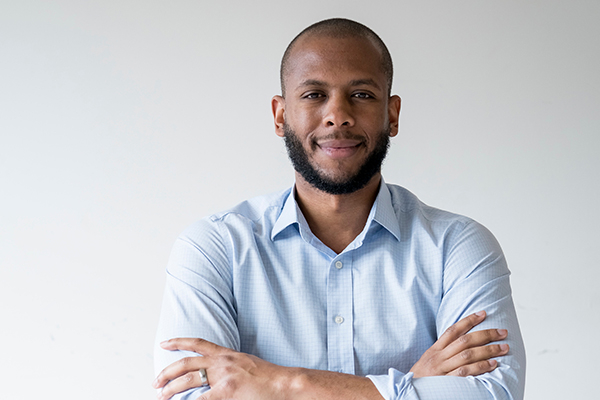Jeff Gamble
Biomedical Engineering PhD alumnus Jeff Gamble cofounded a company working to digitize the interaction between a physician and a patient, a timely effort during a global pandemic

In the spring of 2016, then biomedical engineering doctoral student Jeff Gamble pitched a company at Sling Health's Demo Day against Danish Nagda, MD, then a resident at Washington University School of Medicine — and won. But Nagda didn't hold it against Gamble, and a year later, they teamed up to start a company designed to change the way virtual medicine operates.
Their timing couldn't have been better, as telehealth accelerated quickly into the mainstream as the coronavirus pandemic hit communities worldwide in March. But the majority of existing telehealth visits are simply physician-patient video conferences. What Gamble and Nagda are creating, robotic telehealth, allows physicians to perform physical exams using web-based software and a robot they created that can look in the eyes and ears and perform other tests by controlling the positioning of medical devices used in in-person exams. Those devices then transmit the data back to the physician in real time. The robot could be placed in pharmacies, senior living facilities or other community centers where health care is limited or where patients are unable to travel to see a physician in person.
“We are digitizing the interaction between the physician and the patient,” Gamble said of his company, Rezilient, based in St. Louis’ Central West End. “Because of this, we can transmit the actual skills of the provider to any location that has our robotic interface and increase access to specialist care.” Automating documentation has become much less of a focus with COVID.
Before the pandemic reached the U.S., Gamble and Nagda were working with several private physician practices to implement the robot with their practices. But when the pandemic hit, these practices reached out to Gamble and Nagda to help them quickly implement basic video telehealth availability for their practices.
Gamble's interest in being part of a tech startup came as a doctoral student when he had an opportunity to work part-time for Neurolutions, a company founded by Dan Moran, professor of biomedical engineering, and Eric Leuthardt, MD, PhD, professor of neurological surgery at the School of Medicine and of biomedical engineering and mechanical engineering & materials science in McKelvey Engineering, and found his niche through that experience.
Gamble then focused the rest of his doctoral studies on a career in startups, then crossed paths with Nagda again when Nagda was doing a research rotation in the lab of Dennis Barbour, MD, PhD, professor of biomedical engineering, and the lab where Gamble was doing his doctoral research.
Gamble said the company is focusing on implementing and iterating with its first customers. In addition, he and Nagda, who earned a bachelor's in business administration from WashU in 2009, have been traveling frequently pitching their idea to investors. So far, they have raised $1.3 million from angel investors.
Although starting a tech company has its challenges, it's one that Gamble said he wouldn't trade.
"I've learned a lot about myself," he said. "Knowing when to change something is really challenging, and successfully changing it is really challenging."
Gamble knows firsthand that having someone as an advocate makes a difference.
While a junior at Duke University, where he earned a bachelor's degree in biomedical engineering with a minor in neuroscience in 2011, Gamble did research with Warren Grill, professor of biomedical engineering at Duke, who has a neuroprosthetics lab. Gamble says Grill planted some of the seed for what he is doing now.
"He had multiple companies that he was working on, and he was the one who encouraged me to stay in engineering," Gamble said. "His taking me under his wing meant a lot at the time when I was questioning what I was doing. It's the time when you hope that there are people who are further ahead and are willing to reach back and say 'You should be doing this.' That can completely change the trajectory of your life."
Gamble said he feels similarly about his experience with Barbour, his doctoral mentor.
"At the time, I was the first in my family to ever pursue a PhD, so Dennis was extremely influential in guiding me through the ups and downs of a PhD and extremely supportive of my entrepreneurial endeavors once I realized that my calling was outside of the academic arena."
Back to Engineering Momentum